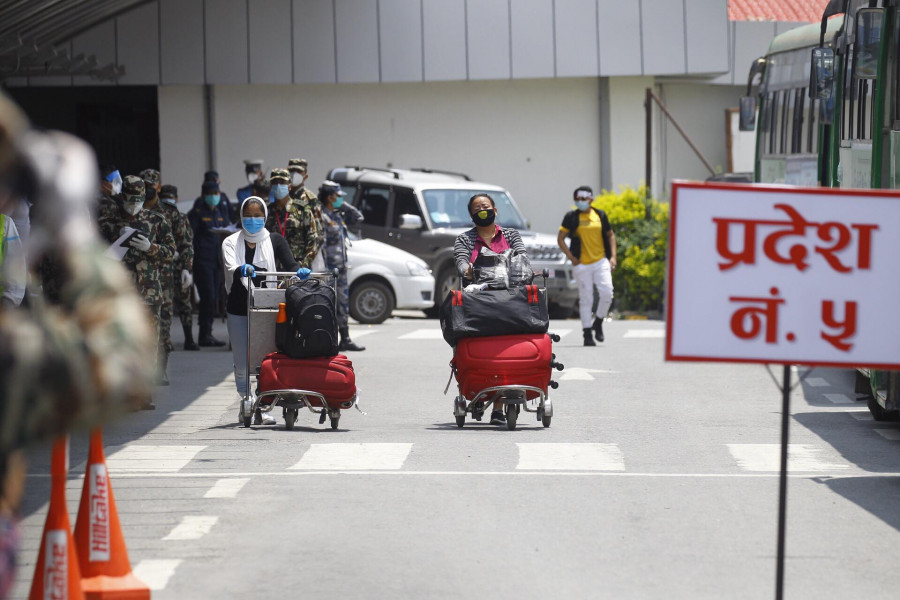National
As migrant workers start returning home, local levels feel the heat to create jobs
Local governments across country prioritise employing returnee migrant workers mainly in agriculture and local development sectors, with some coming up with innovative ideas.
Chandan Kumar Mandal
Purbachauki Rural Municipality of Doti district is a hometown of many overseas migrants.
The place has a population of over 23,000 and nearly 8,500 of them are working abroad—8,000 in India and the remaining work in the Gulf states and Malaysia.
These days, Purbachauki is facing an unprecedented phenomenon of reverse migration of its abroad-based population, prompted by the coronavirus pandemic.
As a consequence, the local government now faces the challenge of providing employment opportunities to returnee youths.
According to Dirgha Raj Bogati, chairperson Purbachauki Rural Municipality, 2,500 youths have already returned from India, and more are expected to come home in the near future.
With the overseas-based youths returning home in droves, the local government has come up with some innovative ideas to promote homegrown jobs.
“As the Covid-19 pandemic has impacted the global economy, our local unit could not remain untouched,” said Bogati. “We have to provide the returnee youths with employment opportunities. We plan to create jobs in the agriculture sector and utilise local resources and skills.”
To encourage youths to farming, the local government of Purbachauki Rural Municipality has introduced a reward scheme based on their annual sales and income. If farmers sell local produce of Rs50,000, they will be rewarded with a cash prize of Rs5,000. Likewise, a prize of Rs10,000 will be awarded to farmers doing business of Rs100,000 and Rs15,000 for farmers selling local produce of above Rs100,000.
“We hope these initiatives will encourage the youths to work in their villages. We will also be giving the best farmer awards from all the seven wards for growing quality produce,” said Bogati. “There will be a common market in the village where every household will be asked to come up with their goods and agricultural produce.”
Besides, the local government will also accept business proposals from returnee migrant workers and support promising enterprises by providing seed money.
As Covid-19 has devastated the labour market around the world, Nepali villages have been seeing an unprecedented arrival of migrant workers. Local governments have been overwhelmed with the burden of reintegrating the returnee youths by providing them with jobs.
During a virtual interaction organised by National Network for Safe Migration, a group of organisations working for promoting safe migration, on Friday, local level representatives said they have been scrambling to create employment opportunities for the youths returning from India and third countries.
Most of these local units have plans to create jobs in agriculture and local development projects. To this end,some local units have come up with creative ideas to attract the returning youths to local jobs.
Phedikhola Rural Municipality of Syangja district looks well-prepared to deal with the problem of imminent unemployment crisis among the people returning home from abroad. As per the records maintained by the rural municipality, 1,156 people are working in third countries and 195 people have gone to India in search of jobs.
To ensure that they are not jobless after returning home, the local government has been in regular touch with the migrant workers abroad as well as their families at home. According to Ghanshyam Subedi, chairperson of the Phedikhola Rural Municipality, 820 overseas-based youths have come into contact and they wish to return home while 175 people have already returned during the lockdown.
“The rural municipality has collected the personal details as well as experience and skills of the workers based in foreign countries. Meanwhile, we have also been counselling the workers and their families,” said Subedi. “When the returnee youths were in quarantine, we distributed brochures explaining about the employment programmes and also conducted virtual interactions with bank representatives to talk about the loan schemes for starting new ventures.”
In a bid to employ returnee migrant workers, the local government of Phedikhola Rural Municipality also plans to utilise uncultivated lands for farming.
“We have around 4,000 ropanis of uncultivated lands. We plan to use at least 2,000 ropanis of land for our employment programme. As many as 324 people are already engaged in various farming-based enterprises on 1,738 ropanis of lands,” said Subedi. “Our main goal is to engage those who have lost their jobs due to Covid-19.”
Besides, the local government is also providing skills training to 300 youths.
Local units from east to west have been coming up with a slew of programmes to provide employment opportunities to returnee migrant workers at their hometowns and villages and to discourage them from migrating for jobs in the future.
Punarbas Municipality in Kanchanpur district of western Nepal, which has already received 4,000 migrants from India out of total 14,000, has also prioritised agriculture-based employment schemes.
Gita Bhetwal, deputy mayor of Gauradaha Municipality in Jhapa of eastern Nepal,
says the local unit is collecting details on returnee workers to assist their socio-economic reintegration upon their return home.
“We have allocated Rs5.7 million for job creations in agriculture and animal husbandry programmes,” said Bhetwal. “The returnee workers will be employed even in ward-level construction projects. The Covid-19 has added the challenge of creating more employment, and we are allocating more budget for that.”
Harion Municipality of Sarlahi, which is situated along the East-West highway, has allocated nearly Rs30 million for creating local jobs.
“As the municipality lies in Madhes and is connected to the national highway, there are many options for employment,” said Ganesh Prasad Prasain, mayor of Harion. “But we have to create sustainable employment opportunities so that the returnee youths do not have to migrate again.”




 10.12°C Kathmandu
10.12°C Kathmandu














